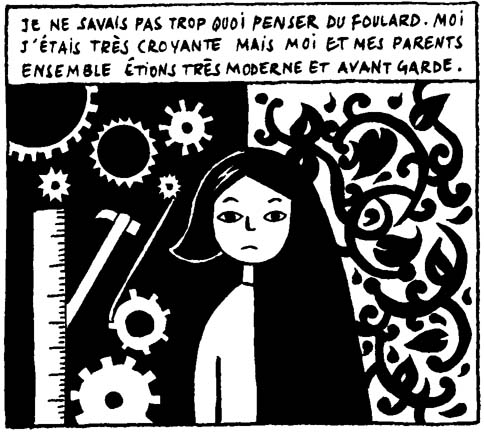Recently in ASTU, we have been discussing about a beautiful graphic novel called Persepolis written by Marjane Satrapi.
Living in the western country, I feel like it’s easy for us to be disconnected from the reality of the situation in countries like Iran. Therefore, I was every intrigued on how a comic book could highlight the misconceptions of Iran’s history. Before reading Persepolis, my knowledges on the Islamic Revolution was limited to what I learn in textbooks at school and what the media projected. However, as I was reading Marjane’s story, I realize my own misperception of the whole situation : instead on focusing only on the regime, I forgot to pay attention to the context, the conditions and the suffering of Iranians. Sometime reality is even worst than what we denounce and that is what Marjane describes to us through short stories that she witnesses herself. Conflicts in Iran has been there for so long that the West has banalized violence : Iran has always been a territory of war which means that Iranians has always lived under an oppressing government and will always be Thus. the omnipresence and the banalization of violence under a totalitarian regime was considered to be “normal”. For example, in Persepolis, we can see that even the kids start to play political games and imitating prisoner who are being tortured.
Through the eyes of an innocent girl, humor is the only way to describe the indescribable.
In class, we talked about the fact it was a coming out of age novel and how she is building her character by constantly changing her mind (about religion, patriotic feeling etc.). I find very unique that the conflict is depicted through a child perspective because the reader’s opinion can also “grow” with her. Most people associate “Iran” with words like “war”, “Iraqi enemy” and even terrorism. But the book reveal new perspectives to see this conflict : to paraphrase Marji’s conversation with the father “The Iraqis have always been our enemies. They want to invade us.” Following those words, her father explain how the government manipulate its people to think that way. Thus, the regime’s illegitimacy makes the civilians behave in certain ways, in order to maintain ‘one man’s religious dictatorship. Therefore, the memoir also encourages the public to think : “Would I have been able to act differently? ”
Furthermore, I find it interesting that Marjane remind us about the individuality of the people in Iran and not just the cliche of the media. She alerts the public about the reality of regime. Because freedom of expression was not allow, it was difficult to be fully aware of the real situation of the country. Moreover, we do not pay enough attention on the causes of the regime and the first victim who are affected by it but we rather focus on the consequences of of its actions. Therefore, some people will directly associate a whole nation with the regime they are under it.
Despite the fact that this is a memoir and it tells a past story, we can easily related to a more recent version of those experience and the consequences. For instance, during my last trip to France the previous summer, when I sat in public with my Iranian friend in the subway, I could see and feel the contemptuous look of people on him, as he was some sort of a threat. He explained that it has always been like that since the terrorist attacks in January that occurs in Paris. It felt absurd to think that people were blaming a complete stranger for a tragic event due to their ignorance or their lack of understanding or blind hatred. Therefore, we sometime generalize people of a country with the decision of its government. In my personal opinion, I strongly disapprove such level of misperception. People should not be judge or oppressed because of their birthplace.
I knew that France was divided in term of immigrants and the idea of Islam (because of the rise Islamophobia). But what I also learn, or at least recognize now is that this also affected some country like Iran itself. As Persepolis show us, people are betraying each other because of fear of difference and disobedience against the regime. Friendship are hard to build, relationship between civilian suffers the lack of trust. They loose the vision of who is the real enemy and the reasons of their actions. Some people claims that those who live under such regime are often an absence of their own consciousness and their autonomy of thinking.At the end of my reading of the narrative Persepolis, I had a clearer vision of the reality of the regime and I value the importance of an authentic memoir. In a modern era where mass control is predominant, we need to stay woke about our surrounding. We see countries like Iran where propaganda is “brainwashing” the population but in western countries we also tend to follow naively the trend of thinking of the majority. To finish with a Marjane Satrapi’s quote : “Once again, I arrived at my usual conclusion: one must educate oneself.”

One Comment